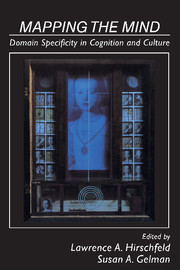Book contents
- Frontmatter
- Contents
- List of contributors
- Preface
- Part I Overview
- Part II The origins of domain knowledge: Biology and evolution
- Part III The origins of domain knowledge: Conceptual approaches
- Part IV Are domains theories?
- Part V Domains across cultures and languages
- 14 First principles can support both universal and culture-specific learning about number and music
- 15 Cognitive constraints on cultural representations: Natural ontologies and religious ideas
- 16 Universal and culture-specific properties of children's mental models of the earth
- 17 Cognitive domains and the structure of the lexicon: The case of the emotions
- Part VI Implications for education
- Author index
- Subject index
16 - Universal and culture-specific properties of children's mental models of the earth
Published online by Cambridge University Press: 04 August 2010
- Frontmatter
- Contents
- List of contributors
- Preface
- Part I Overview
- Part II The origins of domain knowledge: Biology and evolution
- Part III The origins of domain knowledge: Conceptual approaches
- Part IV Are domains theories?
- Part V Domains across cultures and languages
- 14 First principles can support both universal and culture-specific learning about number and music
- 15 Cognitive constraints on cultural representations: Natural ontologies and religious ideas
- 16 Universal and culture-specific properties of children's mental models of the earth
- 17 Cognitive domains and the structure of the lexicon: The case of the emotions
- Part VI Implications for education
- Author index
- Subject index
Summary
This chapter develops some ideas about domain specificity and cultural knowledge based on a series of studies of children's concept of the earth (see Vosniadou, 1989, 1991; Vosniadou & Brewer, 1992, in press). More specifically, I argue that the concept of the earth is originally embedded within a naive theory of physics and is constrained by certain entrenched presuppositions that apply to physical objects in general. Although the process of conceptual change appears to be fundamentally the same in children growing up in culturally diverse backgrounds, there is considerable cultural mediation in the construction of the specific mental models of the earth that children in different cultures form. Finally, it is also argued that the acquisition of the culturally accepted model of a spherical earth as an astronomical object surrounded by space cannot be accounted for as a product of enrichment, but involves a major conceptual reorganization proceeding through the suspension or revision of some of the presuppositions that belong to a naive theory of physics.
Domain-specific constraints
A number of chapters in this volume present persuasive evidence to support the view that the human mind operates on the basis of different domain-specific constraints, reflecting the structure of the specific adaptive problems humans needed to solve over the course of evolution (e.g., Cosmides & Tooby, this volume; Wierzbicka, this volume; Atran, this volume).
One important domain of knowledge for which it is very likely that domain- specific constraints have been developed is the domain of knowledge about the physical world.
- Type
- Chapter
- Information
- Mapping the MindDomain Specificity in Cognition and Culture, pp. 412 - 430Publisher: Cambridge University PressPrint publication year: 1994
- 49
- Cited by



